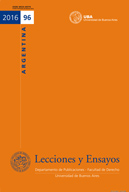El campamento participativo. Por qué la representación política no es virtuosa en sí misma, sino en todo caso un mal necesario
Palabras clave:
Representación, Participación, Deliberación, Derecho Humano a la Democracia, Derecho a la Participación Política, Democracia Participativa, Democracia DeliberativaResumen
En este trabajo defiendo la posición que sostiene que la representación política es un mal necesario, que la participación directa es indispensable para democratizar los procesos de toma de decisiones, y que, por lo tanto, el contenido del derecho a tomar parte en la conducción de los asuntos públicos debe ser leído a esa luz. Para ello, primero (1) presento un argumento afirmativo respecto del ideal de autogobierno como un ideal de participación plena. Luego, (2) intento responder los argumentos presentados por lo que describo como dos corrientes “representativistas” distintas: (a) una clásica, madisoniana, reacia a cualquier idea participativa, y (b) otra más bien moderna, que admite cierto espacio para la participación. A continuación, (3) considero el impacto de estas discusiones sobre la interpretación del derecho humano a tomar parte en la conducción de los asuntos públicos. Finalmente, (4) hago una recapitulación del argumento.
Descargas
Citas
ALEGRE, Marcelo, Igualdad, derecho y política, Fontamara, México D.F., 2010.
ARCHIBUGI, Daniele y KOENIG-ARCHIBUGI, Mathias, “Globalization, Democracy and Cosmopolis: A Bibliographical Essay”, en Daniele Archibugi (ed.) Debating Cosmopolitics, Verso, London and New York, 2003, pp. 273–291.
ARCHIBUGI, Daniele, KOENIG-ARCHIBUGI, Mathias y MARCHETTI, Raffaele, “Introduction. Mapping Global Democracy”, en Daniele Archibugi, Mathias Koenig-Archibugi, Raffaele Marchetti (eds.) Global Democracy. Normative and Empirical Perspectives, Cambridge University Press, Cambridge, 2012, pp. 1-21.
BARBER, Benjamin, Strong Democracy: Participatory Politics for a New Age, University of California Press, Berkeley, 1984.
BAYÓN, Juan C., “¿Necesita la república deliberativa una justificación epistémica?”, Diritto & Questioni Pubbliche, vol. 9, 2009, pp. 189-228.
BEN-ARI, Raphael H., The Legal Status of International Non-Governmental Organizations. Analysis of Past and Present Initiatives (1912–2012), Martinus Nijhoff, Leiden and Boston, 2013.
—, The Normative Position of International Non-Governmental Organizations under International Law, Martinus Nijhoff, Leiden and Boston, 2012.
BENHABIB, Seyla, “Is There a Human Right to Democracy? Beyond Interventionism and Indifference”, en Claudio Corradetti (ed.) Philosophical Dimensions of Human Rights. Some Contemporary Views., Springer, Dordrecht, 2012, pp. 191–213.
BESSON, Samantha, “The Paradox of Democratic Representation. On Whether and How Disagreement Should be Represented”, en Luc Wintgens (ed.) The Theory and Practice of Legislation: Essays in Legisprudence, Ashgate, Aldershot, 2005, pp. 125-161.
BLONDIAUX, Loïc, El nuevo espíritu de la democracia. Actualidad de la democracia participativa., Prometeo, Buenos Aires, 2013.
BLONDIAUX, Loïc. y SINTOMER, Yves, “El imperativo deliberativo”, Estudios Políticos, vol. 24, 2004, pp. 95–114.
BOHMAN, James, “Survey Article: The Coming of Age of Deliberative Democracy”, The Journal of Political Philosophy, vol. 6, n.o 4, 1998, pp. 400-425.
BOYLE, Alan y CHINKIN, Christine, The making of international law, Oxford University Press, Oxford/New York, 2007.
BRENNAN, Geoffrey y HAMLIN, Alan, Democratic Devices and Desires, Cambridge University Press, Cambridge, 2000.
BRIGHOUSE, Harry, “Egalitarianism and Equal Availability of Political Influence”, The Journal of Political Philosophy, vol. 4, n.o 2, 1996, pp. 118-141.
CHARNOVITZ, Steve, “Nongovernmental organizations and international law”, The American journal of international law, vol. 100, n.o 2, 2006, pp. 348-372.
CHRISTIANO, Thomas, “An Instrumental Argument for a Human Right to Democracy”, Philosophy & Public Affairs, vol. 39, n.o 2, 2011, pp. 142–176.
—, The Constitution of Equality. Democratic Authority and its Limits, Oxford University Press, Oxford, 2008.
COHEN, Gerald A., Why Not Socialism?, Princeton University Press, Princeton and Oxford, 2009.
COHEN, Joshua, “Is there a Human Right to Democracy?”, en Christine Sypnowich (ed.) The Egalitarian Conscience: Essays in Honour of G. A. Cohen, Oxford University Press, 2006, pp. 226–248.
CONSTANT, Benjamin, “De la liberté des anciens compareé a celle des modernes”, en Ecrits Politiques, Gallimard, Paris, 1819.
DWORKIN, Ronald, Law’s empire, The Belknap Press of Harvard University Press, Cambridge and London, 1986.
—, Sovereign Virtue. The Theory and Practice of Equality, Harvard University Press, Cambridge and London, 2000.
—, “Taking Rights Seriously”.
—, “What is Equality? Part 4: Political Equality”, University of San Francisco Law Review, vol. 22, 1987, pp. 1-30.
FEREJOHN, John y ROSENBLUTH, Frances, “Electoral Representation and the Aristocratic Thesis”, en Ian Shapiro, Susan Stokes, Elisabeth Jean Wood, Alexander Kirshner (eds.) Political Representation, Cambridge University Press, Cambridge, 2010, pp. 271-303.
FOURNIAU, Jean-Michel, “Information, access to decision-making and public debate in France: the growing demand for deliberative democracy”, Science and Public Policy, vol. 28, n.o 6, 2001, pp. 441–451.
FOX, Gregory H., Democratic governance and international law, Cambridge University Press, Cambridge, UK; New York, 2000.
GARGARELLA, Roberto, “Full representation, deliberation,and impartiality”, en Jon Elster (ed.) Deliberative democracy, Cambridge University Press, Cambridge, 1998, pp. 260-280.
—, Las teorías de la justicia después de Rawls. Un breve manual de filosofía política, Paidós, Barcelona, 1999.
GARSTEN, Bryan, “Representative government and popular sovereignty”, en Ian Shapiro, Susan Stokes, Elisabeth Jean Wood, Alexander Kirshner (eds.) Political Representation, Cambridge University Press, Cambridge, 2010, pp. 90-110.
GILABERT, Pablo, “Is there a Human Right to Democracy? A response to Joshua Cohen”, Revista Latinoamericana de Filosofía Política, vol. 1, n.o 2, 2012, pp. 1–37.
GRIFFIN, C., “Debate: Democracy as a Non-Instrumentally Just Procedure”, The Journal of Political Philosophy, vol. 11, n.o 1, 2003, pp. 111-121.
JONES, Peter, “Intense Preferences, Strong Beliefs and Democratic Decision-making”, Political Studies, vol. XXXVI, 1988, pp. 7-29.
JOSEPH, Sarah y CASTAN, Melissa, The International Covenant on Civil and Political Rights: Cases, Materials, and Commentary, Oxford University Press, Oxford, 2013.
KANT, Immanuel, “Perpetual Peace”, en Han Reiss (ed.) Kant’s Political Writings, Cambridge University Press, New York, 1795.
KATEB, George, “The moral distinctiveness of representative democracy”, Ethics, vol. 91, 1981, pp. 357-374.
KYMLICKA, William, Contemporary Political Philosophy. An Introduction, Second Edi, Oxford University Press, Oxford, 2002.
—, Multicultural Citizenship, Oxford University Press, Oxford, 1995.
LERNER, Josh, Making Democracy Fun. How Game Design Can Empower Citizens and Transform Politics, MIT Press, Cambridge, 2014.
LETSAS, George, A Theory of Interpretation of the European Convention on Human Rights, Oxford University Press, Oxford, 2007.
—, “Strasbourg’s Interpretive Ethic: Lessons for the International Lawyer”, European Journal of International Law, vol. 21, n.o 3, 2010, pp. 509–541.
MADISON, James, “Federalist 10”, en Alexander Hamilton, James Madison, John Jay (eds.) The Federalist Papers, Penguin, New York, 1787.
—, “Federalist 63”, en Alexander Hamilton, James Madison, John Jay (eds.) The Federalist Papers, Penguin, New York, 1787.
MAISLEY, Nahuel, “Cohen v. Cohen: Why a Human Right to (Domestic and Global) Democracy Derives from the Right to Self-Determination”, Latin American Journal of Political Philosophy, vol. 4, n.o 5, 2015.
—, “Completando un proyecto inconcluso. Una propuesta de aplicación de la teoría de la democracia deliberativa de Carlos Nino al plano global”, Análisis Filosófico, 2014.
—, “The Customary Right of Civil Society to Participate in International Law-Making: Access, Guarantees and Voice (Unpublished Manuscript)”, 2016.
—, “The International Right of Rights? Article 25(a) of the ICCPR as a Human Right to Take Part in International Law-Making”, European Journal of International Law, 2017.
—, “The Principle of Participation as a General Principle of Law: Why Civil Society can Derive a Right to Take Part in International Law-Making from Article 38.1.c of the ICJ Statute (Unpublished Manuscript)”, 2016.
MALANCZUK, Peter, Akehurst’s Modern Introduction to International Law, Routledge, New York, 1997.
MANIN, Bernard, The Principles of Representative Government, Cambridge University Press, Cambridge, 1997.
MANSBRIDGE, Jane, BOHMAN, James, CHAMBERS, Simone, ESTLUND, David, FØLLESDAL, Andreas, FUNG, Archong y otros, “The Place of Self-Interest and the Role of Power in Deliberative Democracy”, The Journal of Political Philosophy, vol. 18, n.o 1, 2010, pp. 64–100.
MARMOR, Andrei, “Authority, Equality and Democracy”, Ratio Juris, vol. 18, n.o 3, 2005, pp. 315-345.
MARTÍ, José L., La república deliberativa. Una teoría de la democracia, Marcial Pons, Madrid/Barcelona, 2006.
NGUYEN QUOC, Dinh, DAILLIER, Patrick y PELLET, Alain, Droit International Public, LGDJ, Paris, 2002.
NINO, Carlos S., Derecho, moral y política. Una revisión de la teoría general del Derecho, Siglo XXI, Buenos Aires, 2014.
—, The Constitution of Deliberative Democracy, Yale University Press, New Haven and London, 1996.
NOWAK, Manfred, U.N. Covenant on Civil and Political Rights. CCPR Commentary, 2nd and revised edition, N.P. Engel, Kehl, 2005.
OVEJERO LUCAS, Félix, La libertad inhóspita. Modelos humanos y democracia liberal, Paidós, Barcelona, 2002.
PETER, Fabienne, “The Human Right to Political Participation”, Journal of Ethics & Social Philosophy, vol. 7, n.o 2, 2013, pp. 1–16.
PETERS, Anne, “Realizing Utopia as a Scholarly Endeavour”, European Journal of International Law, vol. 24, n.o 2, 2013, pp. 533–552.
PLOTKE, David, “Representation is Democracy”, Constellations, vol. 4, n.o 1, 1997, pp. 19-34.
PRONTO, Arnold N., “Some Thoughts on the Making of International Law”, European Journal of International Law, vol. 19, n.o 3, 2008, pp. 601–616.
RAWLS, John, A Theory of Justice, Belknap Press of Harvard University Press, Cambridge, 1971.
ROBERTS, Aanthea E., “Traditional and Modern Approaches to Customary International Law: A Reconciliation”, The American Journal of International Law, vol. 95, n.o 4, 2001, pp. 757–791.
RYNGAERT, Cedric, “Imposing international duties on Non-State actors and the legitimacy of international law”, en Math Noortmann, Cedric Ryngaert (eds.) Non-State Actor Dynamics in International Law: From Law Taking to Law Making?, Ashgate, Farnham, Surrey, 2010, pp. 69-90.
SCHUMPETER, Joseph, Capitalism, Socialism, and Democracy, Harper Colophon Books, New York, 1942.
SEN, Amartya, Inequality Reexamined, Harvard University Press, Cambridge, 1992.
—, The Idea of Justice, Belknap Press of Harvard University Press, Cambridge, 2009.
SIEYÈS, Emmanuel-Joseph, Observations sur le rapport du comite de constitution concernant la nouvelle organisation de la France, Baudoin, Imprimeur de l’Assemblee Nationale, Versailles, 1789.
STEINER, Henry J., “Political Participation as a Human Right”, Harvard Human Rights Yearbook, vol. 1, 1988, pp. 77–134.
SZAZI, Eduardo, NGOs: Legitimate Subjects of International Law, Leiden University Press, Leiden, 2012.
TASIOULAS, John, “Customary international law and the quest for global justice”, en Amanda Perrau-Saussine, James Bernard Murphy (eds.) The Nature of Customary Law. Legal, Historical and Philosophical Perspectives., Cambridge University Press, Cambridge, 2009, pp. 307–335.
TULLY, Stephen, Corporations and International Lawmaking, Martinus Nijhoff, Boston and Leiden, 2007.
URBINATI, Nadia, “Representation as Advocacy”, Political Theory, vol. 28, n.o 6, 2000, pp. 758-786.
—, “Representative Democracy and Its Critics”, en Sonia Alonso, John Keane, Wolfgang Merkel (eds.) The Future of Representative Democracy, Cambridge University Press, Cambridge, 2011, pp. 23-49.
—, Representative Democracy. Principles & Genealogy., University of Chicago Press, Chicago and London, 2006.
URBINATI, Nadia y SAFFON, María P., “Procedural Democracy, the Bulwark of Equal Liberty”, Political Theory, vol. 41, n.o 3, 2013, pp. 441-481.
WALDRON, Jeremy, Law and Disagreement, Oxford University Press, Oxford, 1999.
WILLETTS, Peter, “From «Consultative Arrangements» to «Partnership»: The Changing Status of NGOs in Diplomacy at the UN”, Global Governance, vol. 6, n.o 2, 2000, pp. 191–212.
WOODWARD, Barbara K., Global Civil Society in International Lawmaking and Global Governance: Theory and Practice, Martinus Nijhoff, Boston and Leiden, 2010.
YOUNG, Iris M., “Deferring Group Representation”, en Ian Shapiro, Will Kymlicka (eds.) Ethnicity and Group Rights: Nomos XXXIX, NYU Press, New York, 1997, pp. 349-376.
ZÜRN, Michael, “Survey Article: Four Models of a Global Order with Cosmopolitan Intent: An Empirical Assessment”, The Journal of Political Philosophy, vol. 24, n.o 1, 2016, pp. 88-119.
Descargas
Publicado
Cómo citar
Número
Sección
Licencia

Esta obra está bajo una licencia internacional Creative Commons Atribución-NoComercial 4.0.











